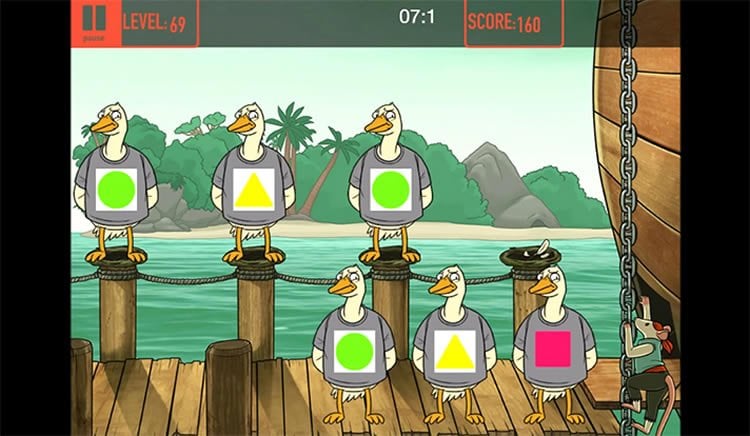Summary: According to researchers, a new computer based brain training program helps improve a child’s performance in math and reading.
Source: Yale.
A computer-based brain training program developed at Yale University helps improve student performance in reading and math — in some cases even more than individualized tutoring, according to a new study published Sept. 12 in Scientific Reports.
In a study of more than 500 second graders, math and reading scores on school- administered tests increased significantly more in children who used the brain training program Activate during the school year than in control classes. The effect on math achievement scores was greater than what has been reported for one-on-one tutoring and the effect on reading scores was greater than what has been reported for summer reading programs.
The findings illustrate that the benefits of the training, conducted three times a week for a four-month period, extend beyond getting better on the training games themselves and lead to improved learning of material that is very different from that in the games.
“The program increases focus, self-control, and memory — cognitive skills essential for learning,” said Dr. Bruce Wexler, professor emeritus of psychiatry at Yale and lead author of the study. “And these are the exactly the cognitive skills affected by poverty, so we believe brain training programs like Activate can help reduce the achievement gaps related to poverty that are seen in schools across the country.”

In a second finding from the same study, researchers discovered that doing a five-minute brain warm-up game just before beginning an Activate math or reading curricular content game can increase math and reading performance. Different warm-up games produced maximal “cognitive priming” effects for math and reading. Cognitive priming with short video games could be more powerful than techniques teachers currently use to create mind-sets to facilitate learning, Wexler said.
The study was conducted along with researchers from the National Center for Research on Evaluation, Standards, and Student Testing, CRESST/UCLA. Wexler is also a founder of C8 Sciences (C8Sciences.com), a Yale startup that markets Activate and other teaching support services.
Funding: Primary funding for the study came from the Roddenberry Foundation.
Source: Bill Hathaway – Yale
Image Source: This NeuroscienceNews.com image is adapted from the Yale press release.
Original Research: Full open access research for “Cognitive Priming and Cognitive Training: Immediate and Far Transfer to Academic Skills in Children” by Bruce E Wexler, Markus Iseli, Seth Leon, William Zaggle, Cynthia Rush, Annette Goodman, A. Esat Imal and Emily Bo in Scientific Reports. Published online September 12 2016 doi:10.1038/srep32859
[cbtabs][cbtab title=”MLA”]Yale. “Video Games Can Have Lasting Impact on Learning.” NeuroscienceNews. NeuroscienceNews, 12 September 2016.
<https://neurosciencenews.com/video-game-learning-5013/>.[/cbtab][cbtab title=”APA”]Yale. (2016, September 12). Video Games Can Have Lasting Impact on Learning. NeuroscienceNews. Retrieved September 12, 2016 from https://neurosciencenews.com/video-game-learning-5013/[/cbtab][cbtab title=”Chicago”]Yale. “Video Games Can Have Lasting Impact on Learning.” https://neurosciencenews.com/video-game-learning-5013/ (accessed September 12, 2016).[/cbtab][/cbtabs]
Abstract
Cognitive Priming and Cognitive Training: Immediate and Far Transfer to Academic Skills in Children
Cognitive operations are supported by dynamically reconfiguring neural systems that integrate processing components widely distributed throughout the brain. The inter-neuronal connections that constitute these systems are powerfully shaped by environmental input. We evaluated the ability of computer-presented brain training games done in school to harness this neuroplastic potential and improve learning in an overall study sample of 583 second-grade children. Doing a 5-minute brain-training game immediately before math or reading curricular content games increased performance on the curricular content games. Doing three 20-minute brain training sessions per week for four months increased gains on school-administered math and reading achievement tests compared to control classes tested at the same times without intervening brain training. These results provide evidence of cognitive priming with immediate effects on learning, and longer-term brain training with far-transfer or generalized effects on academic achievement.
“Cognitive Priming and Cognitive Training: Immediate and Far Transfer to Academic Skills in Children” by Bruce E Wexler, Markus Iseli, Seth Leon, William Zaggle, Cynthia Rush, Annette Goodman, A. Esat Imal and Emily Bo in Scientific Reports. Published online September 12 2016 doi:10.1038/srep32859






